 Petzlover
Petzlover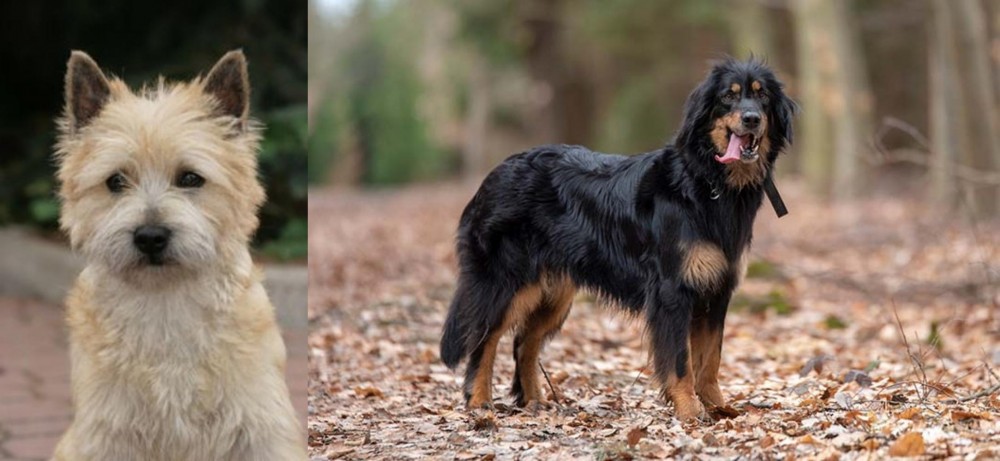 Cairn Terrier is originated from United Kingdom but Hovawart is originated from Germany. Cairn Terrier may grow 37 cm / 14 inches shorter than Hovawart. Cairn Terrier may weigh 43 kg / 94 pounds lesser than Hovawart. Both Cairn Terrier and Hovawart has almost same life span. Both Cairn Terrier and Hovawart has almost same litter size. Both Cairn Terrier and Hovawart requires Low Maintenance.
Cairn Terrier is originated from United Kingdom but Hovawart is originated from Germany. Cairn Terrier may grow 37 cm / 14 inches shorter than Hovawart. Cairn Terrier may weigh 43 kg / 94 pounds lesser than Hovawart. Both Cairn Terrier and Hovawart has almost same life span. Both Cairn Terrier and Hovawart has almost same litter size. Both Cairn Terrier and Hovawart requires Low Maintenance.
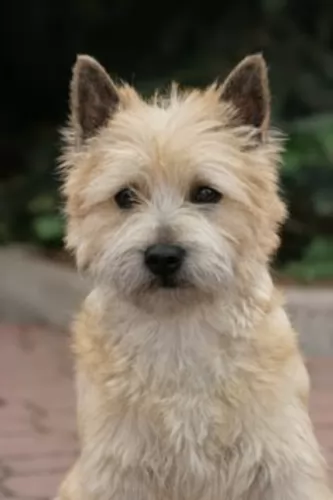 The Cairn Terrier originates in the Scottish Highlands. This feisty little dog was given the name Cairn, as he used to hunt prey between the Scottish cairns. At first the dog was grouped as a ‘Skye Terrier’way back in the 1900s with the Scottish and West Highland White Terrier. Then the different breeds began to be bred separately.
The Cairn Terrier originates in the Scottish Highlands. This feisty little dog was given the name Cairn, as he used to hunt prey between the Scottish cairns. At first the dog was grouped as a ‘Skye Terrier’way back in the 1900s with the Scottish and West Highland White Terrier. Then the different breeds began to be bred separately.
The name Cairn Terrier didn’t appear in print till 1887. It was in 1912 that the Kennel Club of the United Kingdom recognized the Cairn Terrier.
 The Hovawart, is a German Black Forest breed developed as a guard dog for large estates in the medieval era. They first appeared in history in the early 13th century as heroes who saved the German son of a castle lord, despite being injured themselves. The boy they saved grew up to be a German legend. He wrote the oldest German code of law that remained from medieval times. In it he names the Hovawarts as a dog that if you are responsible for hurting, stealing or killing it, you must pay for it or replace it. No other dog had this protection.
The Hovawart, is a German Black Forest breed developed as a guard dog for large estates in the medieval era. They first appeared in history in the early 13th century as heroes who saved the German son of a castle lord, despite being injured themselves. The boy they saved grew up to be a German legend. He wrote the oldest German code of law that remained from medieval times. In it he names the Hovawarts as a dog that if you are responsible for hurting, stealing or killing it, you must pay for it or replace it. No other dog had this protection.
In the late fifteenth century Hovawarts were featured in Heinrich Mynsinger’s “The Five Noble Breeds”. This guard dog breed was esteemed on a level with the hunting dogs – their health a question of life or death for their owner. In the 1500’s the popularity of the breed began to fade. The GSD or German Shepard Dog began to replace the Hovawarts as the preferred guard dog.
By the early 20th century the breed had almost disappeared but were saved by breed enthusiasts in the early 1900’s. Zoologist Kurt Konig was prominent in this effort and went looking in the Black Forest area for dogs working on farms. Using the dogs, he found on these farms, Konig began a breeding program crossing the them with Newfoundland’s, Kuvazoks, Leonbergers, GSD, an African hunting dogs and Bernese Mountain Dogs.
By 1922 the first litter of these pups was entered officially into the German Breeding Registry. In 1937 the Hovawart was recognized by the German Kennel Club. However, many members of the breed died in World War II as they were used widely by the military and not many were left by 1945. Once again breed enthusiasts came to the rescue forming a Coburg Hovawart club. This club still exists and in 1964, for the second time, the breed was recognized by the German Kennel Club. Other countries also began to take notice of this working breed.
The Hovawart has many skills in addition hunting and guarding. The Hovawart does not work for people, he works with them as he is a very independent thinker. He is also good at search and rescue and tracking. An owner of this breed must be stronger, smarter, more alert, intentional and consistent than his Hovawart. These are not dogs for the faint of heart or first-timers.
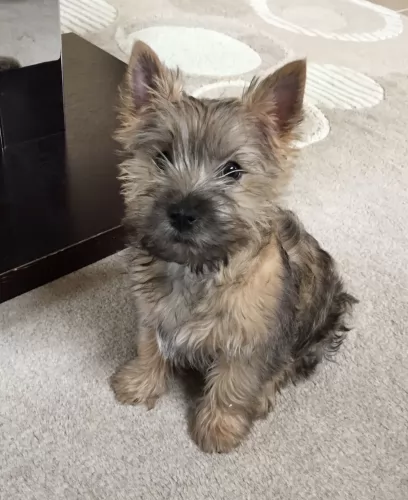 The small sturdily built working Terrier is intelligent and courageous. Bright-eyed, he is small and active and he just loves to work- and party hard with his human family. You’ll see if you’ve got a ball you want to throw for him, his tail is quivering in anticipation and his ears are erect and alert to any noise. He is smart, independent and courageous.
The small sturdily built working Terrier is intelligent and courageous. Bright-eyed, he is small and active and he just loves to work- and party hard with his human family. You’ll see if you’ve got a ball you want to throw for him, his tail is quivering in anticipation and his ears are erect and alert to any noise. He is smart, independent and courageous.
The Cairn Terrier has a tough, weather-resistant coat that can be any color but not white. He has a waterproof double coat – the outer one being wiry while the undercoat is soft. You’ll find the coat in man colours such as grey, black, red and brindle with dark points on the ears and muzzle.
The interesting thing with a Cairn is that when you get a puppy, you can’t be sure what color he will end up being as it changes over the years. The ears are fox-like, small and erect, and the natural medium-to-short tail is held straight out.
 The Hovawart is a proud and majestic dog and his looks match his character. He looks a bit like the Golden Retriever with a powerful and broad forehead. His skull and muzzle are the same length and his nose is black. His oval eyes are a medium to dark brown and his ears are high set and triangular.
The Hovawart is a proud and majestic dog and his looks match his character. He looks a bit like the Golden Retriever with a powerful and broad forehead. His skull and muzzle are the same length and his nose is black. His oval eyes are a medium to dark brown and his ears are high set and triangular.
Their chests are strong, broad and deep. The breed has strong legs straight in front with round, strong and compact feet. They are heavy boned with dense, long coats that lie flat and have a slight wave to them. The coat can be black and gold, blond or black.
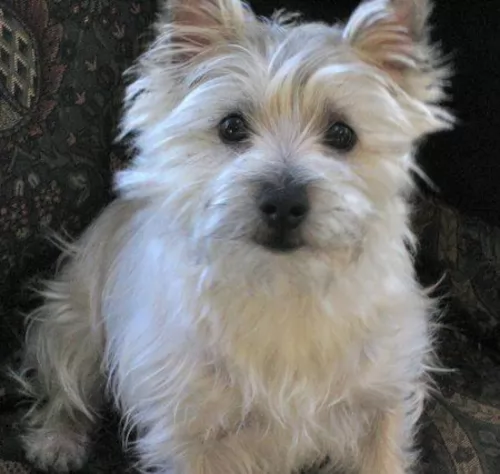 The Cairn Terrier is a fearless, jaunty little dog, known for his courageous spirit and inquisitive nature. He may be small, but he is stubborn. He will respond well to training and socialization which will turn him into the most awesome pet for families. He can make a wonderful friend and playmate for children too. Socialization and training ensures he gets on well with other pets in the household too.
The Cairn Terrier is a fearless, jaunty little dog, known for his courageous spirit and inquisitive nature. He may be small, but he is stubborn. He will respond well to training and socialization which will turn him into the most awesome pet for families. He can make a wonderful friend and playmate for children too. Socialization and training ensures he gets on well with other pets in the household too.
He is small and energetic, and therefore not the kind of dog you can ignore in terms of exercise. He’ll need a good walk every day and he just loves to chase a ball as it takes him back to the days when he was used to chasing- and catching mice.
He isn’t your typical lap-dog at all and with the right care he becomes a devoted, loyal and loving companion.
 They have a great sense of smell and a well-balanced personality.
They have a great sense of smell and a well-balanced personality.
They are not indoor dogs and should have a yard to run in. They do not tolerate hot weather well. They do great out in the country.
They are intelligent independent thinkers. They lengths well with positive reinforcement.
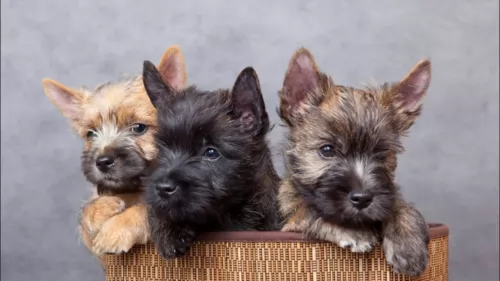 The Cairn Terrier is a robust little dog, and with good care can reach 14 years of age and even older. However, with every dog breed there are some health concerns particular to that breed. With your Cairn Terrier look out for a disease known as Globoid cell leukodystrophy (GCL).
The Cairn Terrier is a robust little dog, and with good care can reach 14 years of age and even older. However, with every dog breed there are some health concerns particular to that breed. With your Cairn Terrier look out for a disease known as Globoid cell leukodystrophy (GCL).
Known also as Krabbe Disease, Globoid cell leukodystrophy (GLD) is a rare but fatal disease. It is caused by a mutation on the dog’s DNA. There is abnormal processing of an enzyme needed for the production of myelin, a substance that protects the nerves in the brain and spinal cord. The dog is weak, it has tremors and isn’t co-ordinated. The Cairn Terrier is a breed of dog more susceptible to GCL.
Your Cairn Terrier may well suffer with joint diseases. These diseases, such as luxating patella which is about loose knee joints, and hip dysplasia which is a degenerative hip disease, can cause plenty of pain and discomfort for your pet.
Glaucoma is an eye disease where there is pressure on the eye, causing inadequate fluid drainage. Without treatment, there can be damage to the optic nerve which can lead to blindness.
 Though their isolation protected them from genetic health issues for centuries, once they were being rejuvenated and mixed with other breeds some common issues began to show up. These include:
Though their isolation protected them from genetic health issues for centuries, once they were being rejuvenated and mixed with other breeds some common issues began to show up. These include:
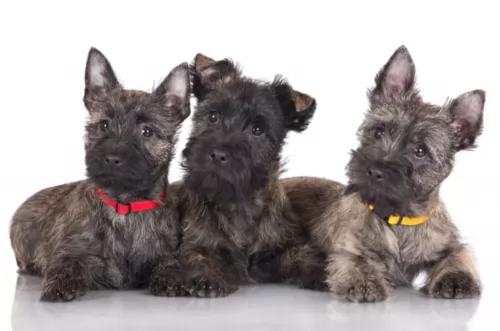 The Cairn Terrier sheds very little and the coat is easy to groom. Give him a thorough brushing twice a week to rid him of loose hairs. Some trimming will be needed as the coat can become shaggy and unruly.
The Cairn Terrier sheds very little and the coat is easy to groom. Give him a thorough brushing twice a week to rid him of loose hairs. Some trimming will be needed as the coat can become shaggy and unruly.
Brush his teeth at least 2 or 3 times a week to prevent tartar build up that can lead to bacteria, gum disease and possible tooth loss.
The Cairn Terrier is small but he is an active dog and therefore needs to be on a high-quality dog food. If you feed him a commercially manufactured food, make sure its appropriate to his age, size and activity levels.
He is a small dog so you want to be careful about not letting him become overweight. Try and alternate his commercially manufactured food with some home-made rice, vegetables and meat and also include some raw meat in from time to time. This is of particular importance as chronic skin allergies are common in all terrier breeds. Make sure that there is always a clean bowl of fresh water available to him day and night.
 Feed breed specific high quality dry food for puppies. Feed 1-2 cups in 3-4 meals per day
Feed breed specific high quality dry food for puppies. Feed 1-2 cups in 3-4 meals per day
Again Feed breed specific high quality dry food for adults. Feed 2-3 cups per day in 1-2 meals per day.
Points for Good Health – Stamina
The Hovawart needs plenty of exercise. Remember this is a mountain farm dog used to working all the time. Walk or jog with them daily. They can excel at field trials, obedience, search and rescue, agility, flyball, therapy dog, and service dog.